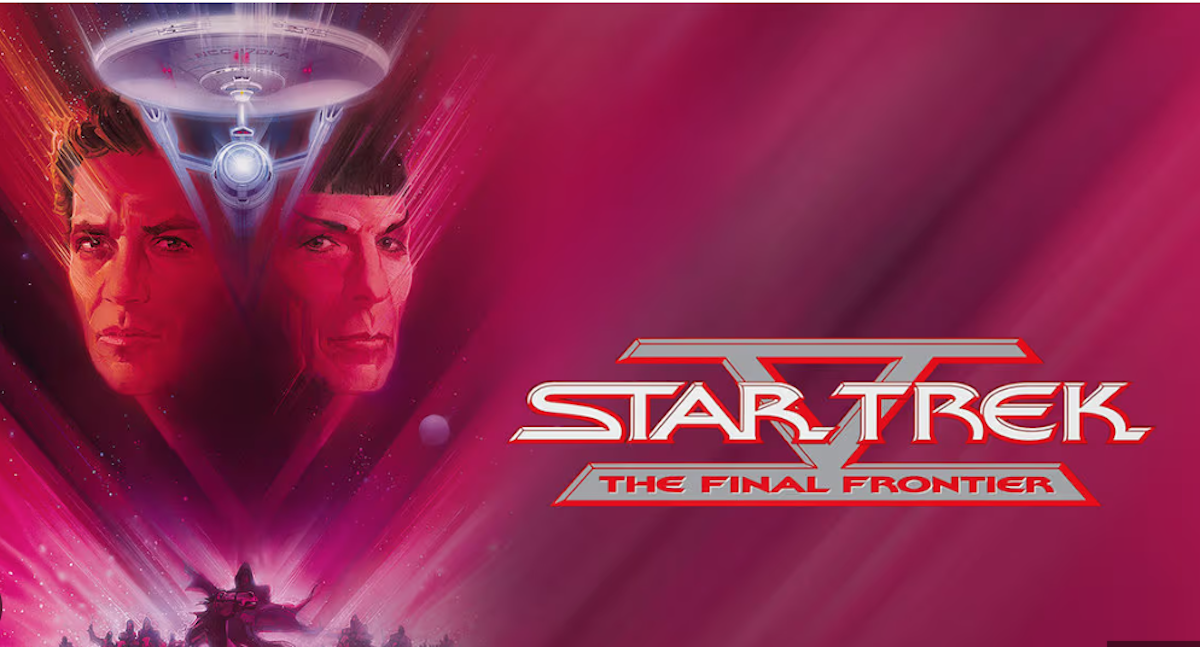When some of the most memorable scenes in a “Star Trek” movie aren’t epic laser-blasting starship clashes, but Kirk (William Shatner), Spock (Leonard Nimoy), and Bones (DeForest Kelley) sitting around a campfire eating beans laced with Tennessee whiskey and singing “Row, Row, Row Your Boat,” you know you might be in trouble.
Oh yeah, and how can we ever unsee Uhura’s (Nichelle Nichols) naked fan dance? “Star Trek V: The Final Frontier” holds the ignoble distinction of being perhaps the low point in that era’s “Star Trek” feature film roster starring “The Original Series” crew, and its forced jokes, budget slashing nightmares, rushed reshoots, terrible special effects by Associates and Ferren, and a weird mission to meet their Maker in the middle of the galaxy have been dissected to infinity and beyond.
Harkening back to more character-driven episodes of “The Original Series,” it was an ambitious, existential narrative concerning deep spiritual and philosophical ideas like the nature of life, the inevitability of death, a literal and figurative search for God, and the necessity of all sentient beings to accept and integrate all life’s sorrows.
However, the actual execution of the screenplay and the shooting woes that resulted in some of the cheesiest lines ever delivered in a “Star Trek” movie have branded this unloved 1989 entry with a bold badge of shame. But is it truly deserving of such criticism upon a modern rewatch?
While certainly short on action and showcasing laughable production design that often looks like something straight out of a bad high school play or micro-budget fan film, it does present some touching character moments between the “Trek” trifecta of Kirk, Spock, and Bones and relevant humanistic topics that don’t seem so uncomfortable today as they might have been 35 years ago.
After the success of the lighter “Star Trek IV: The Voyage Home” from 1986, Paramount was anxious to get a script approved and hurried into production. Though he’d never directed, Shatner’s “equal compensation” clause in his contract awarded him the directing gig due to Leonard Nimoy helming “Star Trek III: The Search for Spock” and “Star Trek IV: The Voyage Home,” which had become the most profitable film to date in the venerable “Star Trek” franchise.
Sure, it all begins with a bit of silliness with Spock (sporting jet-propelled ski boots) rescuing Kirk from a rock climbing accident on Yosemite National Park’s famous El Capitan granite face and the physics-defying cartoonishness on display as they embrace and descend back down to Earth. But it doesn’t shy away from its strong spirituality notions and poignant questions of faith and self-forgiveness.

Co-written by Shatner, producer Harve Bennett, and writer David Loughery, “Star Trek V: The Final Frontier” was released on June 9, 1989 and scored a respectable $17.3 million on premiere weekend, but it took a severe plunge after that promising debut, eventually bottoming out at a worldwide haul of just $70.2 million.
The plotline follows Sybok (Laurence Luckinbill), a charismatic Vulcan cult leader and Spock’s half-brother, who recruits acolytes and hostages on the desert planet of Nimbus III, then hijacks the USS Enterprise to search for God on the fabled planet of Sha Ka Ree in the heart of the galaxy. It then tumbles into absurdity as Kirk, Spock, and Bones join the madman to go galivanting out to encounter a sagacious entity who’s actually an alien charlatan impersonating God to commandeer a starship and escape his own exile from the Great Barrier.
Shatner was honest about his debacle in a recent The Hollywood Reporter interview:
“I wish that I’d had the backing and the courage to do the things I felt I needed to do,” he admits. “My concept was, ‘Star Trek goes in search of God,’ and management said, ‘Well, who’s God? We’ll alienate the nonbeliever, so, no, we can’t do God.’ And then somebody said, ‘What about an alien who thinks they’re God?’ Then it was a series of my inabilities to deal with the management and the budget. I failed. In my mind, I failed horribly. When I’m asked, ‘What do you regret the most?,’ I regret not being equipped emotionally to deal with a large motion picture. So in the absence of my power, the power vacuum filled with people that didn’t make the decisions I would’ve made.”
Another aspect of the film’s failure was the fact that Gene Roddenberry was only an executive consultant on the project since he’d had all his creative control taken away after “Star Trek: The Motion Picture.” “The Final Frontier” was an entry the legendary “Star Trek” creator once deemed “apocryphal” as he believed that Shatner had conveniently borrowed “The Final Frontier’s” concept from Roddenberry’s initial draft for “Star Trek: The Motion Picture” titled, “The God Thing.”
While “Star Trek V: The Final Frontier” is without a doubt a strange and unappetizing entry in the “Star Trek” canon, it is nevertheless an official member of the family and perhaps deserving of a rewatch in celebration of its 35th anniversary this month.
Don’t forget the beans and the marshmallows!





















Discussion about this post